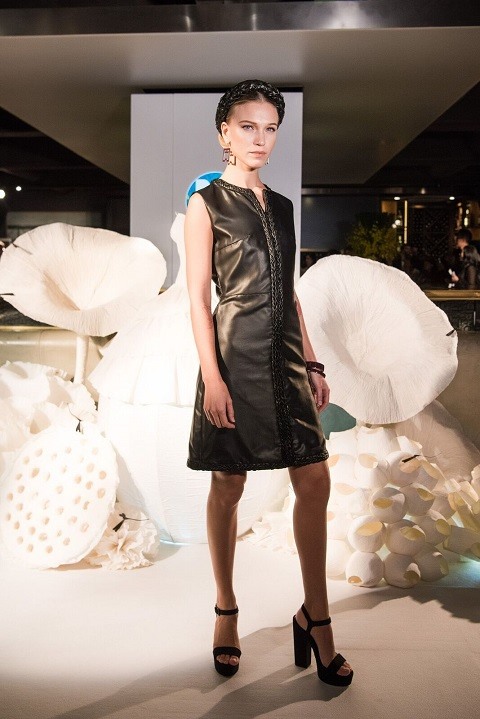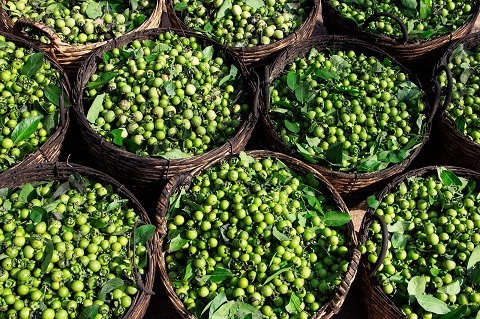 Life & Style
Life & Style

Despite its beauty and significant traditional value, the future of Lãnh Mỹ A Silk remains uncertain as there are now only a few people pursuing production of this unique fabric.
 |
| Stylish threads: Vietnamese fashion designer Nguyễn Công Trí successfully introduced Lãnh Mỹ A Silk via his designs to international friends during Tokyo Fashion Week 16. Photo courtesy of thethaovanhoa.vn |
Despite its beauty and significant traditional value, the future of Lãnh Mỹ A silk remains uncertain as there are now only a few people pursuing production of this unique fabric.
Ups and downs
Lãnh Mỹ A, a delicate cloth woven from the finest silk fibres, comes from Tân Châu Silk Village in the southern province of An Giang.
The area flourished during the 1950s and 1960s when mulberry growing, silkworm rearing and Lãnh Mỹ A silk weaving was popular.
The village products were sold to neighbouring provinces and exported to Cambodia, Laos, France and other European countries, according to Thanh Niên (Young People) newspaper.
However, as synthetic fabric gained popularity in the 1970s, most families in Tân Châu, even the skilled Tám Lăng artisans, switched from pure silk to synthetics and other fabrics to secure their income.
Nguyễn Văn Long, or “Tám Lăng”, was one of the most renowned artisans with expertise in Lãnh Mỹ A silk production. He spent 20 years trading mặc nưa (an ebony-coloured fruit used to dye the silk) and more than 40 years making the silk.
Lãnh Mỹ A silk was abandoned until the 1990s when a French woman named Rose became interested in the unique fabric and persuaded Tám Lăng to resume his original business.
In addition to setting standards that improved the quality of Lãnh Mỹ A silk, Rose was able to export it to France, Hong Kong and other countries every year.
Making of Lãnh Mỹ A
Nguyễn Hữu Trí, Tám Lăng’s son and successor, says the process of producing the natural silk is extremely demanding, taking up to more than a month to complete.
 |
| Raw materials: Mặc nưa is a special fruit that helps Lãnh Mỹ A Silk get its distinctive black, glossy and beautiful colour. Photo courtesy of thethaovanhoa.vn |
Lãnh Mỹ A is made of natural silk fabric processed by a unique method in which it is woven and dyed with the mặc nưa fruit.
After being handpicked and ground, the fruit gives out a distinctive black and beautiful colour that is later mixed with water for dyeing.
As the silk is dyed, it is repeatedly dried and hung under the sun from morning to noon for about 45 days before it is rolled up and rammed to make the silk shiny and durable.
The silk takes its final form as the beautiful black Lãnh Mỹ A after it undergoes a sizing and softening process.
Trí says that there are three factors that make Lãnh Mỹ A silk special. It has to be made with 100 per cent natural silk, dyed with mặc nưa fruit, and woven with the satin technique (the most difficult weaving technique).
Today, Lãnh Mỹ A silk appears in an array of colours such as amber and ash in an effort to keep up with the growing demand in designs.
Despite being a precious silk that represents Việt Nam, Lãnh Mỹ A is currently at risk of being lost forever due to the decreasing quantity of mặc nưa fruit and skilled workers, Trí says.
Mặc nưa fruit is only available between lunar June and December when the resin is good for one or two days after being picked.
Now that many mặc nưa trees have been chopped down for food crops, artisans do not have enough resources to produce Lãnh Mỹ A silk, Trí says.
Future use
The fabric has been recently showcased in many fashion shows, including "The Dreamers" collection featuring more than 100 designs made from Lãnh Mỹ A silk, and created by young designers with a vision to carry the fabric into the future.
In addition to local shows, famous fashion designer Nguyễn Công Trí pushed the unique fabric into the international spotlight by showcasing his designs in the "No 9 Lụa" collection during Tokyo Fashion Week 16.— VNS




